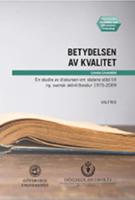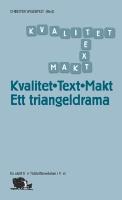
Betydelsen av kvalitet : En studie av diskursen om statens stöd till ny, svensk skönlitteratur 1975-2009
Häftad bok. Institutionen Biblioteks- och informationsvetenskap/Bibliotekshögskolan Högskolan i Borås. 2013. 361 sidor.
Mycket gott skick. Omslagets skyddsplast delvis uppluckrad. Småfläckat inlagesnitt. Doktorsavhandling.
Förlagsfakta
- ISBN
- 9789197876865
- Titel
- Betydelsen av kvalitet [Elektronisk resurs] en studie av diskursen om statens stöd till ny, svensk skönlitteratur 1975-2009
- Författare
- Lindsköld, Linnéa - Högskolan i Borås Institutionen Biblioteks- och informationsvetenskap / Bibliotekshögskolan
- Förlag
- Institutionen Biblioteks- och informationsvetenskap/Bibliotekshögskolan Högskolan i Borås
- Utgivningsår
- 2013
- Språk
- Svenska
- Baksidestext
- The aim of this thesis is to explore the conceptions of aesthetic quality used in Swedish literature policy through a study of the discourse of the state support to new, Swedish fiction 1975-2009. This support scheme is a quality-based retrospective grant, introduced in 1975, aiming to guarantee the quality and versatility of book publishing. It is explored as an expression of cultural policy in a welfare policy setting, where the autonomy of the arts is a central concept. The quality of the book is the foremost criterion for the award of support and quality assessment is carried out by a work group consisting of authors, critics, librarians and researchers. The empirical part of the study analyses arguments concerning state support forwarded in the debate from political documents, articles in newspapers and trade press, debate books and also in six interviews with former members of the workgroups from the 1970s and the 2000s. A discourse policy analysis is used to examine the discourse of the support, how it is legitimized and the conceptions of aesthetic quality embedded in the discourse. The results show that for stakeholders state support is highly legitimate. The support is discursively connected to welfare politics and democracy, even though it is aimed at artifacts, not citizens. It is legitimized as being a support to book production, not for mediating literature. There has been a shift in the conception of quality, from being identified in a negative sense to a positive sense. A professional concept of quality as a driving force is used by the workgroup. The shift towards explicating quality can be seen as a way of protecting the concept of quality in a time where it is perceived as being under threat. The use of quality as the foremost criterion can be seen as resistance against shifts in cultural policy that are perceived as adaptations to market values or politicization. The results render visible the political aspects of the concept of quality in state support.
Diss. , 2013











